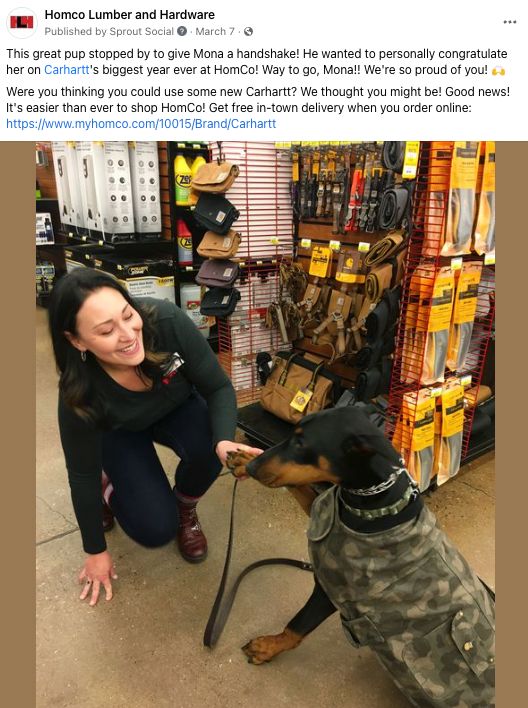Niche products. They don’t get the same airtime as the national brands, but they are a big part of what makes your store unique, and they can help drive footsteps and generate goodwill with your customers and the community.
With 81% of retail shoppers researching purchases online before they buy, if your website is keyword optimized and you’re using a social media strategy to highlight your niche products, the rate of customers finding you in organic searches will go up exponentially, which translates to more footsteps, brand recognition and trust.
We’re talking to two of the Mojo team experts, Michelle, who runs our social media strategy, and Christina, our lead web developer. They’ll dive into why and how social media and websites are such powerful tools for driving niche product sales.
AWARENESS, TRUST, AND CONNECTION
MMG: How does a good social presence help a brand’s niche sales?
Michelle: Awareness. For example, one of our clients is an Ace that sells paddleboards and snowshoes, and you would never guess unless you’d been told or saw it in the store. Another great example is a client who wanted to highlight their canning products and increase sales with a canning class. We built an Instagram-only campaign, selling tickets and advertising only on their Instagram account, and the event sold out. Beyond being a successful experiment for them on social media, it created a buzz, gained them valuable social equity, and built trust with their online community.
Research shows that 18% of website visitors are influenced by social media to visit a company’s website. Once there, they are more loyal and satisfied customers, and they spend more than visitors who were not influenced by social media. Social currency has real, tangible value for businesses.
MMG: How does no social presence, or an inauthentic one, hurt a brand’s ability to sell niche products or communicate what they are?
Michelle: If you’re known for one thing, like hardware, then unless people are shown what else you have or what your values are, they’re not going to know. This is especially important in selling those niche products that don’t have the benefit of big brand advertising dollars or national recognition. For example, we have a client who has a store that sells local frozen fish and another location inland that sells local beef jerky and pizza crust.
If that client didn’t tell their customers about these unique products, they’d never sell, but more importantly, customers have to already trust the store’s brand, the store’s reputation, and values to risk buying a product they don’t know anything about.
STORYTELLING AND CONNECTION
MMG: When running a niche-product social media campaign, what are the top things you focus on communicating to customers?
Michelle: This goes back to what we were just talking about. Building trust is a top priority. It’s like saying, “You believed us when we told you Traeger grills were awesome, and now we have a new, local product, so you should trust us on that too.”
Giving customers background on why is also important. For example, a client in Phoenix brought in a backpack with a built-in mister. We helped them tell the story of why they love the product and the local Phoenix resident who made it. We helped them home in on their audience. I’m an ultralight runner, so I’m not their ideal customer, but someone who’s going on a fun hike with friends, or runs shorter distances and wants to keep running outside in the summer, families with kids, it’s all about telling the story and connecting with the person who’s going to want to use that niche product.
MMG: How is social media an integral part of getting exposure for lesser-known products that don’t have the benefit of a national ad campaign and presence?
Michelle: How else would people know about it unless they just stumble upon it? Like I was saying before about making sure we’re speaking to the correct audience – if that niche product is say, stand-up paddle boards, then everyone who paddleboards will follow that store for updates, stories, new products – anything paddleboard – and just by targeting that audience you have a whole new niche following.
We have a client who sells Carhartt – not all hardware stores carry clothing, so part of our strategy is to highlight this department. This client sent us a picture of the Carhartt department manager shaking the paw of a customer’s dog. We captioned it, “This great pup stopped by to give Mona a handshake! He wanted to personally congratulate her on Carhartt’s biggest year ever at HomCo! Way to go, Mona!! We’re so proud of you! 🙌”
By looking at the data, we’ve learned that a photo with a pet gets more engagement than most. So we use that information to tell a bigger story of this store and its values – these are the intangible things that the data tells us are important to customers:
- Employees are supported and celebrated
- We have highly knowledgeable employees in our niche departments
- We love animals
- We sell Carhartt
- We’re fun!
STAY RELEVANT, CREATE VALUE AND BUILD LOYALTY
MMG: Why is it important to have a knowledgeable web-development team build your website? Isn’t it basically just words and pictures?
Christina: A knowledgeable web development team not only builds a website but has the expertise to make it an incredible multi-faceted tool. They build, focusing on user experience (UX):
1. What does the user need to know?
2. What actions do they need to take next?
3. What kind of reassurance do they need to make the plunge and purchase or visit your physical location?
A good website gives the user the same experience as being in your store – the same great service, expertise, and fast results – because if it doesn’t, you’re going to lose that customer, just like you would in your brick-and-mortar store.
But just great UX is not enough. A good web development team will also ensure your website is primed to rank high on search engines and loads as fast as possible (which is imperative to compete not only in niche markets but with the giants like Amazon and Home Depot) and so much more! An optimized website is more than just words and images, it is an experience and often the first experience your customer will ever have with your company. We help make it a memorable and enjoyable one.
MMG: Is SEO really all that important?
Christina: SEO is one of the highest forms of “word of mouth.” Ranking high organically on search engines means that your website is visible to many users and that these users know you are relevant for their needs. Keywords are one of the building blocks of SEO, and choosing keywords that highlight your niche products will help you stand out in the search rankings, especially among box stores. You can gain a loyal following from people who otherwise would never have been to your site or into your store, all based on a search for a unique interest.
What Is SEO?
We want to take a minute out of our interview to give a 30,000-foot view of what SEO is and how it works to help your website get found by people searching the internet.
SEO, in short, is all of the backend data, words, tags, categories, etc., that give Google the information it needs to serve up your website as one of the top results in someone’s search. Google is constantly crawling your website, analyzing keywords, links, titles of images, metadata, and every piece of written, image, or video content you’ve got.
Google takes that information, and whenever someone types something into the query field, it uses everything it’s collected to come up with the best results match – and you want to be visible to Google, so you’re visible to everyone else. Read our full article about SEO and keywords to learn more about ranking with Google.
MMG: What happens on the web development/backend side of things that makes one website better than another in terms of driving traffic or creating brand loyalty?
Christina: One of the most unseen ways a website can create brand loyalty is through integrations. When you can integrate websites with other tools like CRMs (customer relationship management tools) and email automation, you can make sure that when a customer asks you a question or signs up for your email list, you can stay relevant and continue to give them value through other platforms. As I mentioned above, this is also a place where speed plays a factor. A well-built site on the backend runs quicker, provides a seamless user experience, and can reach more users since not everyone has quality internet when searching.
MMG: Why should I hire a dedicated team like Mojo to build my website rather than a freelancer who can build it on Squarespace for less?
Christina: When you hire a dedicated team, you are getting not just a pretty website but one that focuses on the entire user journey. With the knowledge of an entire marketing team behind a web build, expertise is woven in from every aspect of marketing. The website then supports all efforts (SEO, social media, user experience, sales, and more). You get a functional revenue driver versus an online billboard.
NICHE PRODUCTS DRIVE BRAND AWARENESS & FOOTSTEPS
With an optimized website, your niche products become one of your most powerful tools for raising brand awareness and driving organic search – ultimately bringing new footsteps and more revenue to your stores. Are you interested in finding new ways to boost your Niche products? We wrote a great article on Quick and Easy Tips for Marketing Your Outside Vendor & Niche Products! Have questions or would like to talk more about building a strategy for your niche products? If so, click the contact button below to speak with Rand about enhancing your niche product marketing strategy!


Michelle has been with Mountain Mojo Group as the Lead Social Media Manager since 2020. Throughout her time here, she has led the efforts in social media, content writing, branding strategies, and graphic design for our clients in the Hardware Retail Industry.

Christina has been with Mountain Mojo Group as our lead web developer since 2020. She leads with five years of front-end web development and PPC advertising experience. Christina is a website UX/UI specialist and works directly with our Hardware Retail Industry clients to optimize their websites to meet the unique demand of their customer base.



